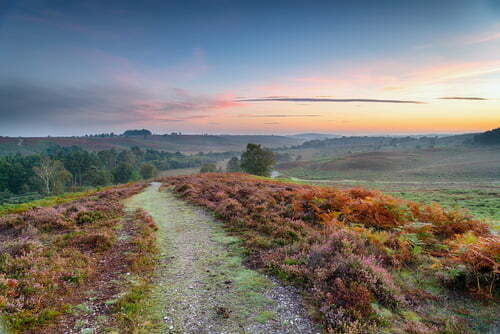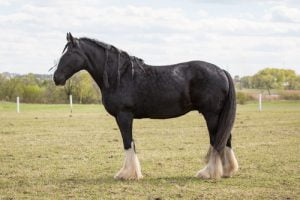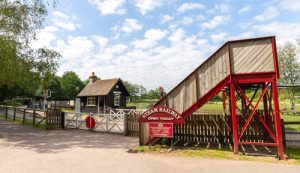
Verwood in Brief
Verwood is a town and civil parish in the east of Dorset, southwest England. The town lies 10 miles (16 km) north of Bournemouth, 13 miles (21 km) northeast of Poole, and just 3 miles (5 km) west of the New Forest. Up until the late 19th century, Verwood was part of the parish of Cranborne. The town’s history, which is similar to much of the surrounding area, is one of late settlement. The parish largely consists of Verwood and the village of Three Legged Cross. Verwood is arguably best known for its long association with the pottery industry. In 2020, the town’s population was estimated at 13,724.
A Fleeting History
Early Times
While there is no evidence to suggest that the Romans settled in Verwood, they were certainly active in the area. It is even suggested that it was the Romans who were responsible for Verwood’s pottery industry. Salisbury Museum records show that in the 3rd and 4th centuries Romans extracted clay from Verwood for use in their New Forest potteries. However, the early history of the pottery industry in and around Verwood is extremely sketchy. The known history of the local area around Verwood begins circa AD 980 when the Saxons established a priory at Cranborne. Located about 4 miles northwest of Verwood, the abbey was founded by an order of Benedictine monks.
The next big event in Verwood was around the end of the 12th century. That’s when the local pottery industry was re-established by the local population. In 1199, Verwood was part of the estate of Cranborne Chase. It was then that it was acquired by King John for hunting. By 1288, Verwood had been given the name ‘Beau Bois’ (beautiful wood) by its Norman landowners, the Edmondsham family. However, by 1377, records show that the name had been anglicised to Fairwoode.
In 1579, a huge fire occurred in Blandford, destroying all local administration records, including those for Verwood. In 1616, the ownership of Verwood changed when the 380 square-mile Cranborne Chase was sold by the Crown. The massive estate was granted to Robert Cecil, the 1st Earl of Salisbury. In 1731, another serious fire occurred in Blandford, destroying many more records of the area. The unidentified children orphaned by the fire were given the surname Blandford.
Smugglers, Church, and the Railway
The mid-18th century Verwood saw a number of turnpike roads built in the area. It was also during this time that smugglers began to shift their operations from Kent and Sussex to the Dorset coast. The smugglers won favour with locals by involving them in the bootleg operations and sharing the profits. Verwood lay on one of the county’s main smuggling routes, that ran between Christchurch and Cranborne.
In 1829, an Anglican chapel of ease was built at Verwood to serve the parish church at Cranborne. From 1837, the chapel served as a National School. That was until the Church of England Infant School was built in 1847. In 1866, the railway linking Salisbury with Southampton and Dorchester arrived in Verwood. It formed part of the Salisbury and Dorset branch of the London and South West Railway. The single-track line had a passing place at Verwood Station.
In 1876, a primitive Methodist church was built in Verwood. A year later, the Parish of Verwood was created, enabling it to sever its long association with Cranborne. In 1891, the population of Verwood was officially recorded in the National Census as 1,190. On 5 March 1894, Verwood officially achieved civil parish status. The first elections for the newly formed Verwood Parish Council were held in December 1894.
The 20th Century
In 1909, a permanent Methodist Church was built at the site of the previous primitive church. Lloyds became the first bank in the town when it opened a branch in 1919. In 1928, the very first Verwood Carnival took place after being largely organised by the local vicar’s wife. The 1931 national census revealed that the town’s population had risen to 1,605. In 1935, gas arrived in Verwood supplied by the local Bournemouth Gas and Water Company.
In 1952, the last of Verwood’s potteries ceased production due to financial viability. Another major blow came in 1964 when the town’s train station closed after 98 years of operation following the line’s closure. By 1987, the town’s population had risen rapidly to almost 10,000. The Parish Council then passed the necessary resolution to become a Town Council. Further developments saw the town get a middle school in 1988, a fire station in 1992, and a police station in 1994.
The Modern Era
Verwood has a fairly mixed economy but tourism is minimal.
The main events in the Verwood calendar are the annual carnival, held in May, and the Rustic Fayre, which takes place on August Bank Holiday. An indoor market is held at the town’s Memorial Hall every Friday morning.
Verwood is twinned with Champtoceaux in the Maine-et-Loire département of France and Liederbach am Taunusarchive in the Main-Taunus Kreis of Germany.
Getting to Verwood
The road distance between central London and Verwood is around 97 miles. The town sits at the crossroads of the B3081 and the B3072. The most direct route from London is via the M3/M27/A31/B3081. There are a number of routes to Verwood from the North and The Midlands.
The closest mainline train station to Verwood is Bournemouth, around 10.5 miles away. South West trains operate an hourly service between London Waterloo and Bournemouth, which takes around 2 hours 15 mins. Transport options between Bournemouth and Verwood include the heritage steam However, there’s also an hourly bus service which takes around 35 minutes.
The nearest airport to Verwood is Bournemouth (BOH), 9 miles away. Bristol (BRS) airport, 72 miles away, is the nearest major airport.
A Notable Resident
Harry ‘Buster’ Merryfield (1920 – 1999) was an actor best known for starring as ‘Uncle Albert’ in the much-loved BBC sitcom ‘Only Fools and Horses’. He played the role for 11 years between 1985 and 1996. Merryfield, a long-time resident of Verwood, was buried at the town’s St Michael and All Angels Church in June 1999.
Did you know?
The first known cabbage to be grown in Britain was grown at Wimborne St Giles, a village about 5 miles northwest of Verwood. Historical records show that the cabbage was introduced to Britain from the Netherlands by Sir Anthony Ashley in 1539. He grew Britain’s first cabbage plant in his garden at St Giles House in Wimborne. Sir Ashley was buried at the local parish church where his tomb proudly displays a representation of the cabbage.
Sport in Verwood
Verwood Town FC
Verwood Town FC currently (2021) plays in Division 1 of the Wessex League. Nicknamed ‘The Potters’ they play their home games at Potterne Park.
Verwood Rugby Club
Verwood RC is a rugby union team whose 1st XV competes in Dorset & Wilts Division 3 South. They play their home games at Potterne Park.
Verwood Cricket Club
Verwood Cricket Club runs a number of men’s, women’s, and youth teams. The first XI play in the Bristol & District Cricket Association (BDCA). Home games are played at Potterne Park.
Things to see and do!
Verwood Hub
The Hub is a multi-purpose venue that hosts a range of live music, theatre, art, conferences, workshops, children’s activities, and other community-based projects. It also houses a surround sound cinema, a state-of-the-art gym, and a café.
The Verwood Heathland Heritage Centre
The small museum houses a primitive country pottery workshop, complete with an exhibition area. The museum focuses on Verwood’s local pottery industry. There’s a coffee shop serving up a range of drinks and snacks on site. The centre is open 9,30 am to 12 noon, Monday to Saturday.
Verwood Heavy Horse Farm Park
The park is set in the scenic Dorset countryside about 2 miles from Verwood. It offers visitors the chance to experience “hands-on” farm life. As well as the majestic shire horses, there’s a blacksmith museum, gypsy wagons, pony rides, a go-cart arena, and a café/gift shop.

Image credit: Marina Kondratenko/Shutterstock.com
Edmondsham House and Gardens
Edmonsham House is a fine Tudor country mansion, that was extended in the Georgian period. The Edmondsham estate has remained within the ownership of the same family since the 16th century. The gardens are open between April and October, Sunday & Wednesday, 2 pm – 5 pm, but the house has more restricted opening times.
Moors Valley Country Park
The Moors Valley Country Park consisting of some 750 acres of woodland and lowland heath is 5 miles south of Verwood. Activities and attractions in the park, include a Go Ape activity centre, miles and miles of cycling and walking trails, and a narrow-gauge steam train. You can also play golf or just choose to chill out by the lake. You’ll also find a restaurant, shops, and children’s play areas at site.

Moors Valley Country Park Steam Railway. Image credit: Stefan Kadar/Shutterstock.com
Anyone for Golf?
The Crane Valley golf course is located just a mile outside Verwood. The club boasts both an 18-hole and 9-hole course, some of which borders the Crane River. There’s also a floodlit driving range and a clubhouse that overlooks the scenic 184-acre site. Visiting players are welcome and the course fees are quite reasonable.
Liberty’s Owl, Raptor and Reptile Centre
Liberty’s is located near Ringwood, on the edge of the New Forest, about 7 miles from Verwood. It’s home to a large collection of birds of prey and also has an indoor reptile house, that houses snakes, lizards, and spiders. You can observe the birds in free fight and get up close and personal with a variety of reptiles. Various displays are held throughout the day.
Where to stay?
Accommodation in Verwood is fairly limited but nearby (4 – 7 miles) Wimborne, Ringwood, Ferndown and Cranborne, offer a bit more choice. Verwood itself mostly offers holiday let stays, while further afield you be able to find more traditional accommodation such as inns, B&Bs, guesthouses, etc. If you are looking for a hotel, then Bournemouth around 10 miles away, offers the most choice.
Moving to Verwood?
Properties in Verwood sold for an average price of approximately £386,000 over the last year (Oct 2021). The best-selling properties were detached houses, which sold for an average price of around £437,000. Terraced houses sold for an average price of £249,000, semi-detached properties for £287,000, and flats fetched £189,000. Overall, the average sold property price in Verwood over the last year was 10% up on the previous year.
Thinking of a Staycation?
Are you thinking of holidaying in the UK sometime soon? If so, why not check out some of our other travel guides for some staycation ideas? I think you’ll be surprised at the variety of great things to do in the UK’s fairly green and mostly pleasant land.
Header image credit: Helen Hotson/Shutterstock.com
Why not take our Verwood quiz?
Quiz Maker – powered by Riddle

